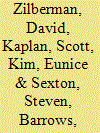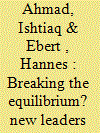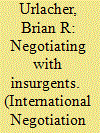|
|
|
Sort Order |
|
|
|
Items / Page
|
|
|
|
|
|
|
| Srl | Item |
| 1 |
ID:
130300


|
|
|
|
|
| Publication |
2014.
|
| Summary/Abstract |
Genetically engineered (GE) foods apply new molecular technologies to agriculture. Widely adopted in the United States, Brazil and Argentina for the production of cons, soybeans, and cotton, they are practically banned in Europe and tightly regulated throughout the world. We have found that GE foods have significantly increase supplies cons, soybeans, and cotton, and lowered their prices, Thus improving food security, GE foods have already contributed to a reductions in the use of pesticides and emissions of greenhouse gases.
|
|
|
|
|
|
|
|
|
|
|
|
|
|
|
|
| 2 |
ID:
138497


|
|
|
|
|
| Summary/Abstract |
The election of new governments in Pakistan and India in 2013 and 2014, respectively, has sparked controversies about the likely trajectory of the enduring rivalry. Emerging individual and domestic conditions reportedly created new opportunities for incremental rapprochement. Equipped with strong political mandates and backed by powerful constituencies, Pakistan's Nawaz Sharif and India's Narendra Modi initially set out to stabilize and revive their countries’ fragile economies and declared improved bilateral ties as a key precondition for implementing their economic agendas. However, mutual recriminations and border tensions resurfaced soon to prevent the revival of the stalled diplomatic dialogue in late 2014. Drawing on a thorough review of research on rivalry maintenance and termination and, in particular, the assumptions of the punctuated equilibrium model developed by Paul Diehl and Gary Goertz, this paper demonstrates how the conflict's structural complexities are likely to persist and undermine the chances for conflict resolution in the years ahead. The prevalent role of the army and a vibrant anti-Indian Islamic ideology in Pakistan, the persistence of a conflict lobby in India, lingering territorial feuds and ever increasing power asymmetries between the two countries, and decreasing third-party mediation in the Indo-Pakistani conflict will likely suffocate any initiative, however well-intended or pragmatic it may be. Even if bold leadership manages to revive a comprehensive peace process, it would have to be based on systematic confidence building measures in order to make it resilient to crises.
|
|
|
|
|
|
|
|
|
|
|
|
|
|
|
|
| 3 |
ID:
123170


|
|
|
|
|
| Publication |
2013.
|
| Summary/Abstract |
Abstract High costs have long been seen as motivating conflict participants to seek peace. This article discusses two types of deviations from the "hurting-stalemate" logic: negotiations in the absence of high costs and non-negotiation in the face of high costs. Two prominent explanations for these deviations are discussed and evaluated, initially through a statistical analysis of peace overtures in intrastate conflicts and then through a case study of the Indian civil war in Kashmir. The results suggest that theoretical explanations focusing on the preferences and political strength of leaders have traction at all levels of violence. Variables associated with shifts in perception, such as leadership change or political shocks, seem to have different effects as the level of violence in a conflict changes.
|
|
|
|
|
|
|
|
|
|
|
|
|
|
|
|
|
|
|
|
|